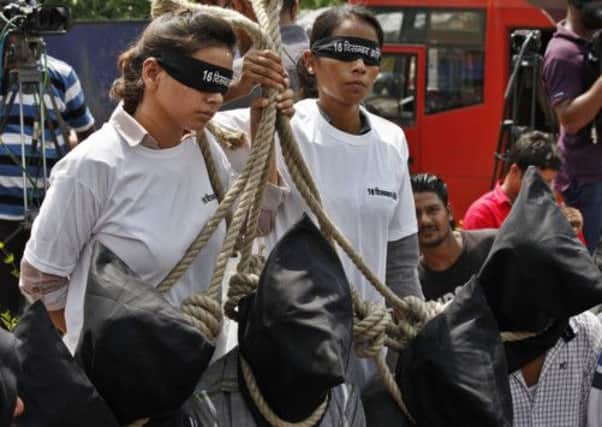India: Courts fail thousands of rape victims


And she won’t have heard about the guilty verdict passed down on the four men accused of the assault yesterday, or that they face the death penalty.
The 49-year-old low-caste woman was herself raped, by four policemen in a village police station in the central state of Madhya Pradesh. That was four years ago, and she is still waiting for justice.
Advertisement
Hide AdAdvertisement
Hide Ad“It’s taking a long time. I’ve been to the court so many times, but still I am waiting. Each time, the hearing is delayed and delayed,” said the woman, speaking by telephone from Jamwada village in Betul district.
“It’s been four years. It is costly and time-consuming to keep going to court, but I want those men who did this to me to get what they deserve. I don’t know when that will be or if it will ever happen,” said the woman, who cannot be identified.
A special fast-track court took seven months to pronounce a verdict in the Delhi gang rape, a shocking assault that made headlines around the globe and sparked debate in India about an unbridled culture of crimes against women.
Human rights lawyers say the outcry over the Delhi case made it an exception to the rule of a criminal justice system that fails thousands of rape victims in India. For them, the judicial process is archaic, under- resourced, gender-insensitive and painfully slow.
“While we applaud this verdict and the relative speed with which the trial was conducted, we mourn the fact that there are so many survivors out there who are neither getting any kind of media attention, nor are they getting any kind of judicial attention,” says Rebecca Mammen John, a Supreme Court lawyer. “As a result, their cases are languishing in courts with no end in sight.”
Police in New Delhi say that only four out of ten rapes are reported, largely because of the deep-rooted conservatism of Indian society, where many victims are scared to come forward for fear of being “shamed” by their family and communities.
One of the biggest obstacles to winning justice for rape victims is the length of the trials. An average case can take five to ten years to reach judgment, legal experts say.
India has far too few courts, judges and prosecutors for its 1.2 billion people. There are more than 23,000 rape cases alone pending before the high courts, according to the law ministry.
Advertisement
Hide AdAdvertisement
Hide Ad“This verdict is welcomed but this case should not be an exceptional one due to all the media attention,” warned Kavita Krishnan, secretary of the All India Progressive Women’s Association, after Tuesday’s verdict.
“Rather it should set a standard. It cannot be tokenism. It has to be for all women.”
One in ten men admit forcing a woman to have sex with them
ABOUT one in ten men in regions of Asia have said they raped a woman who was not their partner, according to a study of sexual violence. When their wife or girlfriend was included, that figure rose to about a quarter.
International researchers said their startling findings – based on a survey of six Asian countries – should change perceptions about how common violence against women is and prompt major campaigns to prevent it.
In the research, male interviewers surveyed more than 10,000 men in Bangladesh, China, Cambodia, Indonesia, Sri Lanka and Papua New Guinea. The word “rape” was not used in the questions, but the men were asked if they had ever forced a woman to have sex when she wasn’t willing or if they had ever forced sex on someone who was too drunk, or drugged, to consent.
In most places, scientists concluded between 6 to 8 per cent of men had raped a woman who wasn’t their partner. When they included wives and girlfriends, the figures were mostly between 30 to 57 per cent. The lowest rates were in Bangladesh and Indonesia and the highest were in Papua New Guinea.
Of those who acknowledged forcing a woman to have sex, more than 70 per cent of men said it was because of “sexual entitlement”. Nearly 60 per cent said they were bored.
MARIA CHENG